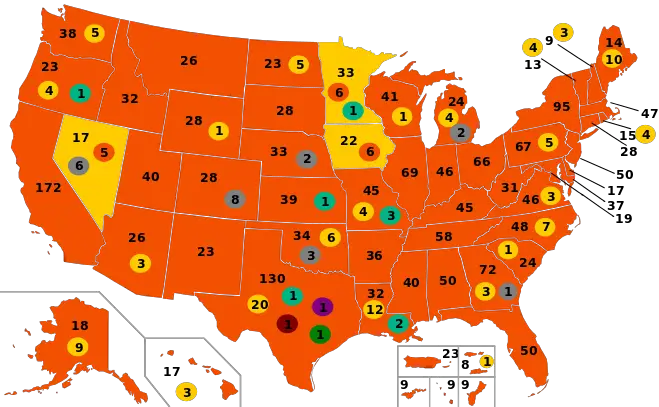I was listening to the BBC late Saturday night. There was a lot of talk about our election. But they didn’t comprehend the nuance. They played down the wins by Cruz, saying that he only won in two small states, while Trump won in two big states.
That’s true, of course, however, as reader “NativeCalifornian” noted on our “Rundown” page, Cruz won 64 delegates, to Trump’s 49—gaining 15.
Although Trump is way ahead in the national polls, picking a nominee is not a national matter. We vote state-by-state. Just as our November election will be decided state-by-state in the Electoral College. That’s why George Bush “won” in 2000, even though Al Gore won the popular count by more than a half-million votes.
Democrats have been grousing about that ever since. However, they may not have a case. Nate Silver notes that Bush played the system in 2000, to win Electoral College votes, not popular votes:
So Mr. Gore would have won the election if not for the Electoral College, right?
Actually, not so fast.
Presidential campaigns strive to maximize their chances of winning the Electoral College. They devote more resources — advertising dollars, field offices, candidate visits, and so forth — to states that might be decisive in determining its outcome.
We can see some tangible effects of this in 2008, when Barack Obama — who had much more money and much better field operations than John McCain — over-performed in swing states relative to non-competitive ones.
Nate Silver’s point is that if it were not for the Electoral College, Bush would have focused more on big states, like California and New York, trying to win voters—not states. So Bush may have won the popular vote with a different strategy.
Rubio is using a similar strategy this year. He is focusing on the big states at the end, so his people are not that worried about losing most of the smaller states early.
But all the states matter. That’s the upside of the Electoral College and the state primary system. Otherwise, candidates would ignore most of the geographic country. After all, most of our population is in cities, and in just 11 states: California, Texas, Florida, New York, Illinois, Pennsylvania, Ohio, Georgia, North Carolina, Michigan, and New Jersey.
So candidates have to decide what kind of people live in which states, and therefore, which states are more likely to vote for his or her chosen issues. (Which is also why Cruz says one thing in one state, and something completely different in another.)
But beyond the focus on states, we also have the question of whether a state has a primary or a caucus. A primary is a private ballot, so individuals have to be won over. Cruz does better in caucus states, since people hash it out, and therefore, it’s easier to argue and convince caucus members to vote your way.
Then, there’s the issue of proportional vs. “winner-take-all” states. We noted that Rubio is trying to work that angle, but there’s a whole different issue. . .
The GOP has set up the system so that the early states are proportional. So even if a candidate runs away with the number of states, he may only have a small lead in the delegate count. That way, if a candidate rises whom they don’t like, they would have time to beat him or her down, and if swayed, the later winner-take-all states will give large blocks of delegates to the candidate of their choice, leaving none for an upstart.
Because of that, Trump is only slightly in the lead in the delegate count, despite winning many more states, and having a commanding lead in the national polls. If the GOP establishment can succeed in scaring people away from Trump, he could still easily lose the nomination.
Donate Now to Support Election Central
- Help defend independent journalism
- Directly support this website and our efforts
